By Luna Pearl Woolf | An Opera for Solo Voices and Orchestra | 60′
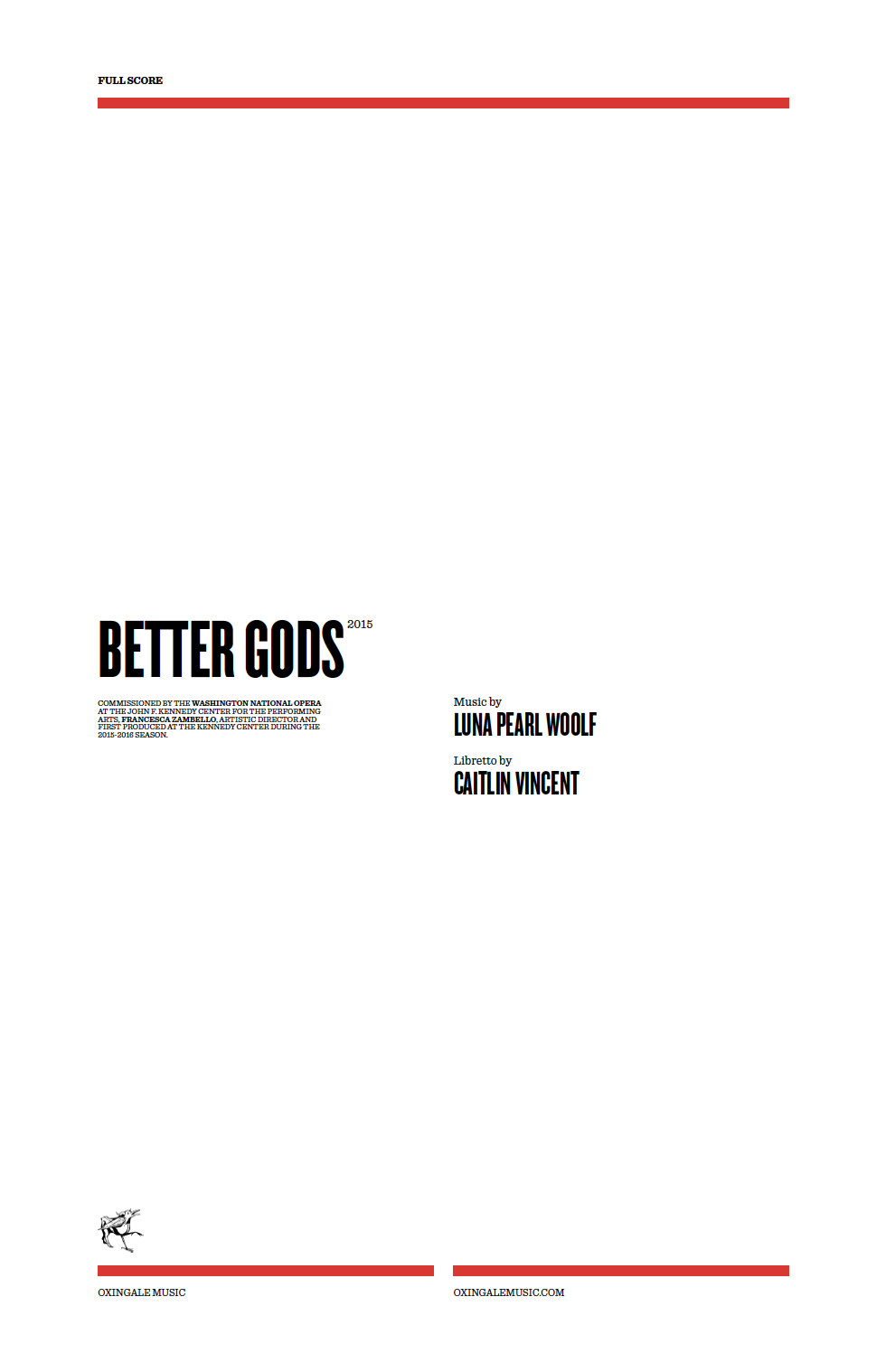
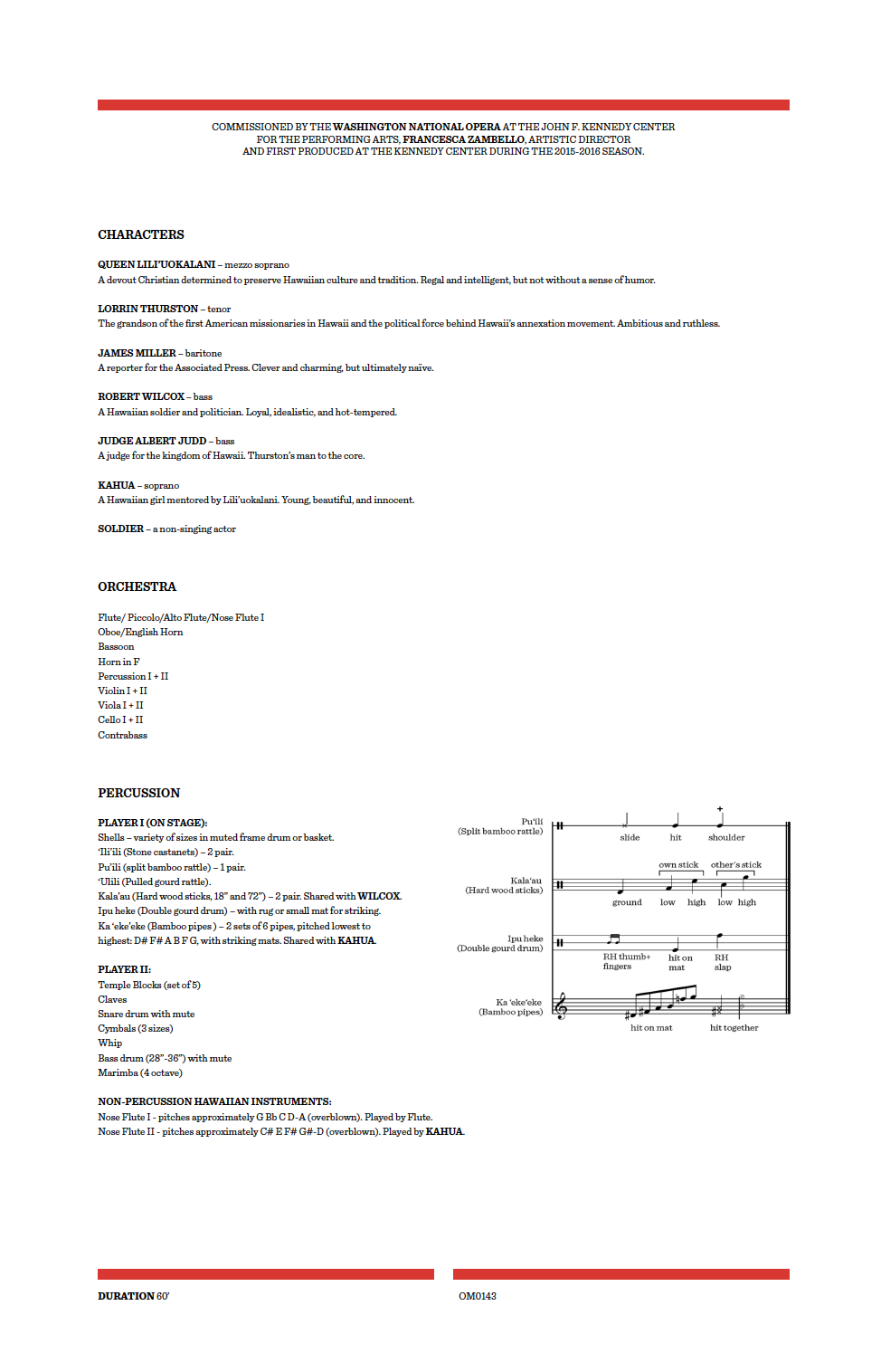
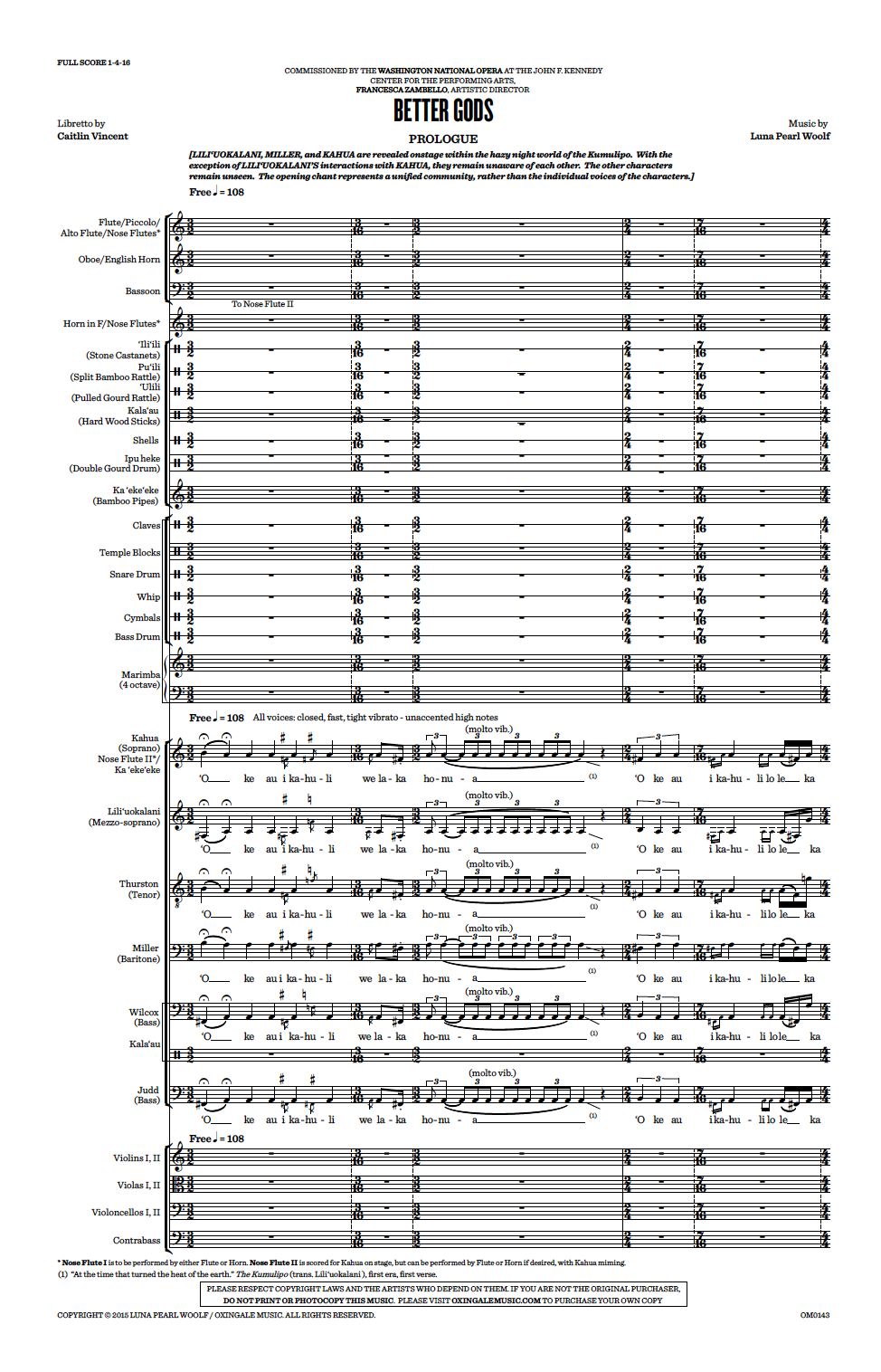
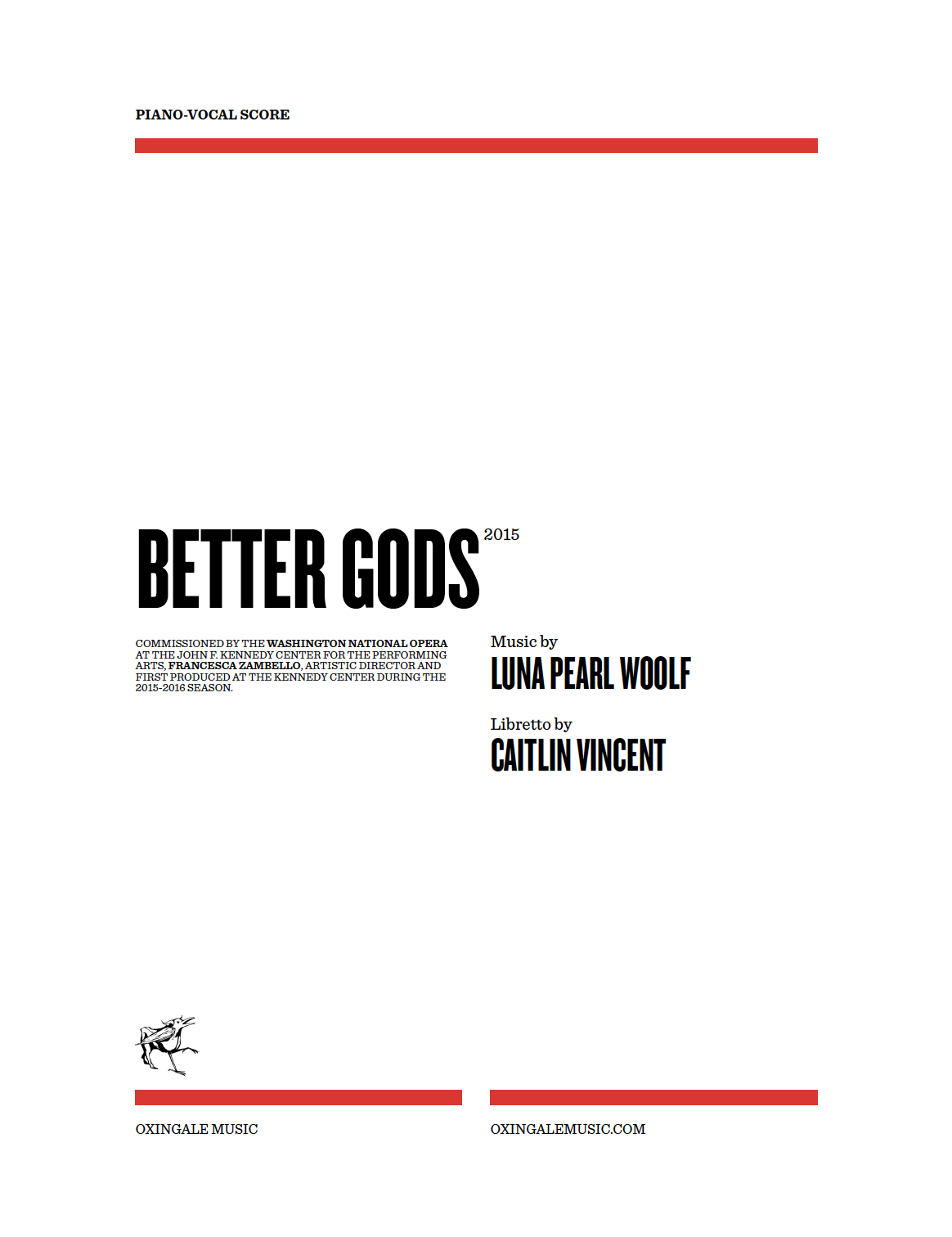
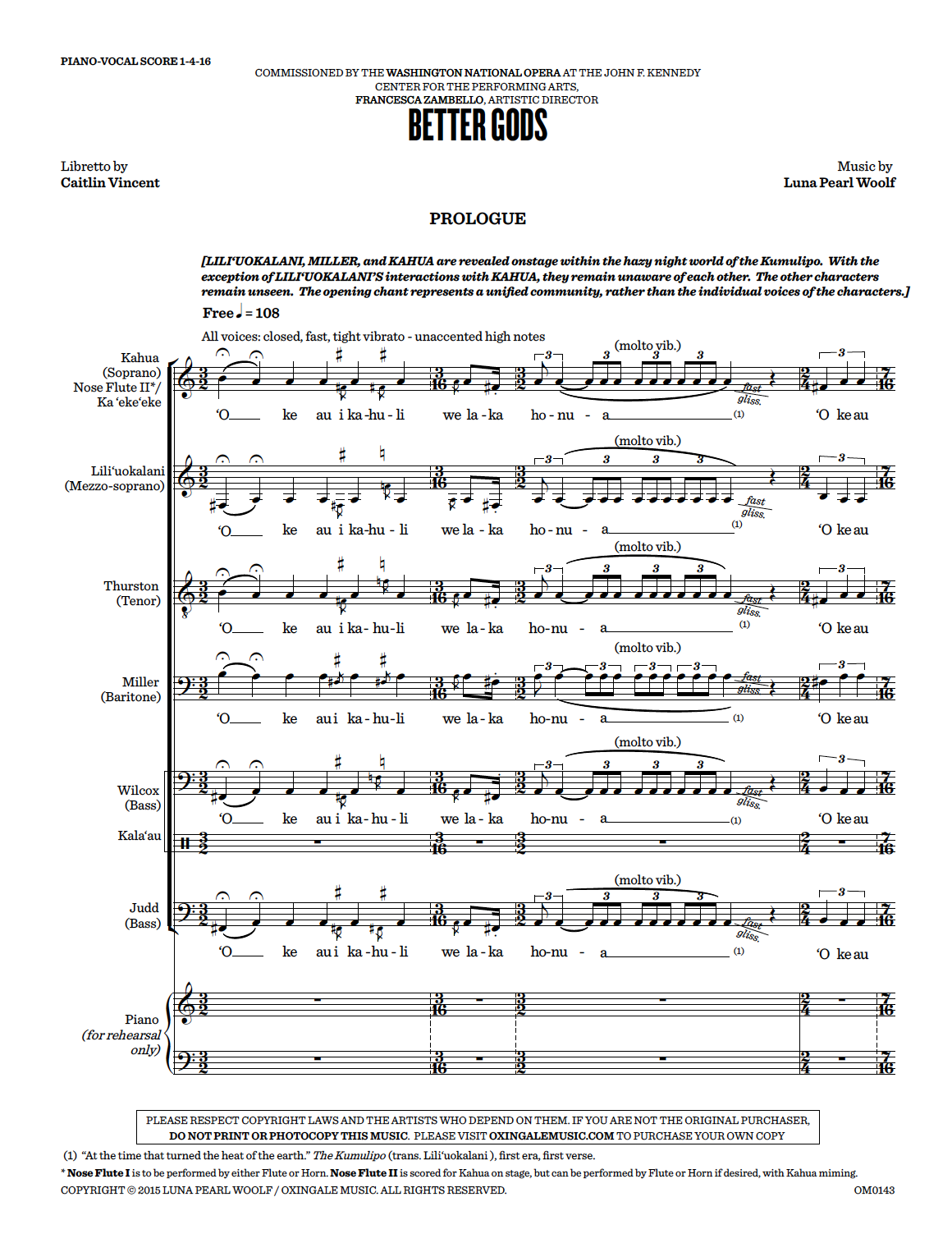
Title: Better Gods
Composer: Luna Pearl Woolf
Libretto by: Caitlin Vincent
Year Composed: 2015
Instrumentation: For 6 Solo Voices, Flute, Oboe, Bassoon, Horn, Percussion and Strings.
Duration: 60′
Format: Full Score in C
Page Size: 11″x17″
Catalog Number: OM0143
Format: Piano-Vocal Score
Page Size: 1etter
Catalog Number: OM0143PV
Performance parts (1 Full Score, 10x PV Score, 1 each flute, oboe, bassoon, horn, percussion 1, 2x percussion 2, 7x strings) are available for rental (OM0143R). Please note that percussion instrument rental would be a separate arrangement.
Please contact us regarding grand rights for any performances.
For more information about perusal scores, rentals, or wholesale/bulk discounts, please contact us.
For more information about our order process for print and PDF purchases, check out our FAQ page.
For the performance page about Woolf’s opera Better Gods, please click here.
From the composer:
CHARACTERS
QUEEN LILI’UOKALANI – mezzo soprano
A devout Christian determined to preserve Hawaiian culture and tradition. Regal and intelligent, but not without a sense of humor.
LORRIN THURSTON – tenor
The grandson of the first American missionaries in Hawaii and the political force behind Hawaii’s annexation movement. Ambitious and
ruthless.
JAMES MILLER – baritone
A reporter for the Associated Press. Clever and charming, but ultimately naïve.
ROBERT WILCOX – bass
A Hawaiian soldier and politician. Loyal, idealistic, and hot-tempered.
JUDGE ALBERT JUDD – bass
A judge for the kingdom of Hawaii. Thurston’s man to the core.
KAHUA – soprano
A Hawaiian girl mentored by Lili’uokalani. Young, beautiful, and innocent.
SOLDIER – a non-singing actor
HISTORICAL CONTEXT
On January 17, 1893, Lorrin Thurston and a small group of American businessmen staged a coup d’état against the native monarch of Hawaii, Queen Lili’uokalani. The queen had proposed a new constitution that would restore voting rights to Hawaiian citizens while limiting foreign influence in the government. Fearing the loss of their wealth and political power, Thurston and his supporters claimed the queen had threatened American life and property and arranged for a company of U.S. Marines to land in Honolulu for their “protection.” Aided by the marines, the so called Annexation Club removed Lili’uokalani from power and established a Provisional Government to rule until an annexation agreement with the United States could be finalized.
Over the next two years, Lili’uokalani worked tirelessly to regain her throne, even appealing directly to President Grover Cleveland. Although President Cleveland described the overthrow as an “act of war,” the U.S. Congress determined that both the Provisional Government and the U.S. Marines were innocent of any wrongdoing and declined to restore the Queen to power.
The conflict came to a head in 1895, when Hawaiian royalists staged an unsuccessful revolution against the Provisional Government. When a cache of rebel weapons was found buried near Lili’uokalani’s house, the queen was arrested and tried for treason. Soon afterward, Lili’uokalani was forced to abdicate her throne and formally declare the end of the Hawaiian monarchy in exchange for the lives of her imprisoned supporters. She spent he next several months under house arrest at Iolani Palace. During her imprisonment, Lili’uokalani composed numerous songs and translated the traditional Creation Chant into English in an effort to preserve Hawaiian culture for future generations.
Although Lili’uokalani continued to protest the annexation of her country after her release, Hawaii was officially annexed in 1898 and became a territory of the United States two years later. In 1993, President Bill Clinton formally apologized for the role played by the U.S. government in overthrowing the Hawaiian kingdom.
Today, there remains an active sovereignty movement in Hawaii, with some groups arguing for Hawaii to be restored as an independent nation and others advocating for tribal sovereignty similar to that of Native American populations. Some organizations even claim that Hawaii’s statehood represents a continued illegal occupation by the United States. Lorrin Thurston’s grandson, Thurston Twigg-Smith (b. 1921), is a vocal critic of the Hawaiian sovereignty movement and has continuously defended his grandfather’s actions against Queen Lili’uokalani. A noted philanthropist, he is currently one of the wealthiest residents of Hawaii.
ABOUT THE CREATION CHANT
The Creation Chant, or the Kumulipo, is a Hawaiian chant that describes the creation of the
world over the course of a single cosmic night. Unlike other cultures that view darkness as a source of evil, the ancient Hawaiians viewed night and darkness in a positive sense: as a time of creation.
The Kumulipo consists of 2,101 lines and 16 “eras,” divided between night or “po” (associated with divinity) and day or “ao” (associated with mankind.) The Kumulipo was traditionally recited to honor the fertility god Lono during the New Year festival season of Makahiki. Lili’uokalani translated the full Kumulipo into English during her house arrest at Iolani Palace. Her translation was published in 1897.
Commission/Dedication: Commissioned by the Washington National Opera at the John F. Kennedy Center for the Performing Arts, Francesca Zambello, artistic director, and first produced at The Kennedy Center during the 2015-16 season.
